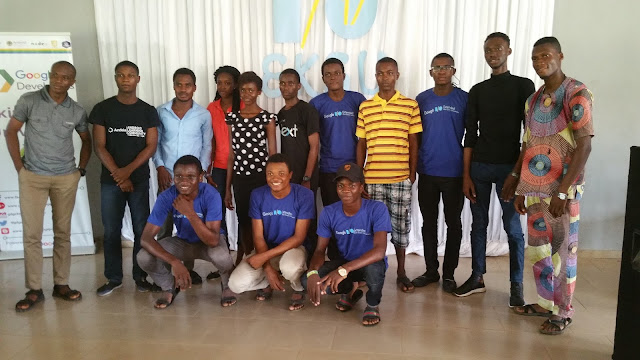The Future of Google Developer Group Member .. [A MUST READ]

Overview
Google Developer Groups together form the largest community of Developers on earth. And we are now at a Nexus - technology defined companies will become the way forward in all fields within the next three years. We can either pull together to create a powerful force for change which permeates down to a local level in a way big corporations can never achieve, or we can stay fragmented and irrelevant - just a talking shop. Let’s seize the day.
What is a Developer?
A Developer is a mindset rather than a job. People who like to see how things work or make them work, rather than just accepting that they do. Someone who develops apps for fun and because it intrigues them. They do it all the time, not just at work. I see it as like a guitarist - a calling and something you do for fun at every opportunity.
Developers are often paid to do something else. They develop to make what they do work better. Like to code in their spare time. Or do a bit of code, bit of graphics, bit of content. It's like the joke "What do you say to an up and coming actress?" "Big Mac and Fries please".
GDGs focus on only a small subset - the people who work full-time in big companies as backroom boys. Let’s reach out to the part timers, the means to an enders and the code for fun people. Formalise self-taught skills and fill in the gaps, deepen understanding and broaden skillsets. Break down barriers - the gaps between skills are shrinking and, for example, front-end developers can now manage APIs and put software in the cloud - skills which they previously needed to hand off to a back-end developer. We need to create an end-to-end mentality.
In 19th century companies, you grew by adding people. Managing those people was the core skill to be successful. So managers earned the big bucks and took the top jobs.
Business is now about data and automated process. Developers and Datascientists are the pivotal people in scaling companies.
Developers define what a company is to their customers. Make the interaction nice or nasty, useful or frustrating. Create customer conversions and turn the funnel from 1 in a 100 to 1 in 10, perhaps even 1 in 1. And they drive the word of mouth to keep existing customers and find new ones.
Developers also turn these interactions straight into revenue, post it to accounts and order the next batch. Make sure the right stock is in the right places at the right time. Manage the interactions with suppliers, partners and subcontractors. Even drive the PR which maintains the stock price.
Developers ARE the company. We need to drive this transformation in role and status.
The Technology Future
“We are in the Second Machine Age. In the first we removed the constraints of human muscles. In the second we move beyond the constraints of the human mind” Erik Brynjolfsson
We are still in the front half of the chessboard in the exponential growth of technology. And, as Microsoft showed this week, the future is very different from what we’re doing now.
The skills Developers require will change too. Normally this happens by step change - milking the current skill set until it is of no use, then retraining. We can help them evolve and create a learning path which outperforms the market - a machine learning methodology which improves skills every time we use them.
Corporations or Communities
“The dream of the last century was to own a home. The dream of this century will be to own a company. Working for somebody else is like being a renter for your whole life. In the twenty-first century, we’ll all aspire to own a much larger piece of our lives.” Chris Dixon - Andreasson Horowitz
People will start companies straight from college and their future career progression will be in creating ever larger businesses, not becoming larger cogs in corporations.
The cry from every startup is “we just need a CTO”. That’s because they think idea first, technology later. This should be reversed “Now technology can do this, this enables this business transformation”.
Startups should be Developer led - it is easier to teach Developers management than teaching Managers to become Developers.
Profit is not the only Motive
“Just as every person has a book in them, so every developer has an app in them. It is these which will drive effective startups over the next few decades as we move beyond 20th century business models.”
In the industrial age people endured hard, boring jobs because they had to feed themselves and their families. But Developers are in demand. They can work where they want to. Money stops being the major motivator above subsistence level - feeling you are doing something valuable and part of something important takes over. So if your company is focused just on making money you won’t attract the best people.
Google has taken a lead here, promoting 20% time. The GDGs can drive this message home to the grassroots, creating projects, unearthing social good projects and linking them with communities and encouraging companies to sponsor, give time to and make happen.
3 New Strategies for the next three years
Future Developer
Universities are still their customary two decades behind. They don’t even recognise Developer as a career, never mind teach towards it in a structured path. But the need for good Developers is about to become so acute it holds the whole economy back.
The aims of Future Developer are:
- To make Developer an aspirational job title which people will consider as a career and be happy to tell people they are at parties, even perhaps persuade their parents that it is a real job.
- Make sure people know what they’re getting into, through coding with professionals, working alongside on projects and work experience.
- Show people how Developer has replaced Manager as the driver of company performance and inspire people to see it as the way to make a real difference to the world.
- Create a startup culture which puts Developers at the centre of startups.
- Inspire Lecturers and Professors in Maths, Computer Science and Statistics departments to look at the impact of what they are achieving with students, give them clout in the organisation and make their teaching more career focused.
Develop the Developer
.jpg) We will need tens of thousands of new developers in the next decade and there simply aren’t enough trained people. Ask Google how hard it is to find top Developers in Silly Valley - we will soon be the same in the UK. But there are lots of people with basic understanding of coding principles and some skills, however old.
We will need tens of thousands of new developers in the next decade and there simply aren’t enough trained people. Ask Google how hard it is to find top Developers in Silly Valley - we will soon be the same in the UK. But there are lots of people with basic understanding of coding principles and some skills, however old.
Aims here are:
- Encourage nanodegrees etc. for people to cross-train, upskill and gain recognition for self-taught coding capability.
- Move people on from old languages to the ones future products will require.
- Make multi-skilling possible, blurring the divide between front and back end so that people can do an end-to-end job.
- Turn “Design for the desktop” skills into mobile ones and BigIT skills into App and Microservices Development.
Virtual CTO
Many companies don’t even realise how fast they are being left behind. And many startups are being built along 20th century lines with Developer as an afterthought. The virtual CTO will look at the startup idea or business model and translate it into software terms, educating the team on what is required, then sourcing the team to create it and maintain and develop it as the company re-iterates.
Acting as a virtual CTO will also help Developers recognise the problems startups face and give them a trial run before they become co-founders themselves.
And working in this structured way will raise the profile of Developers as core to a company’s performance, opening up opportunities to turn 20th century companies into 21st century ones.
Oh - and a quick win.
Google has some core products - Android, Angular, Cloud Platform, Apps for Work, Marketing… Each of these in most regions has its own community. By setting up GDG as the umbrella organisations for these, then running subgroups for them, we increase the membership of the local GDG and the influence it has. As customers migrate from desktop to mobile and on-premise to cloud for the back end, we also can influence and smoothe these transitions. We shouldn’t be having a meeting every couple of months for a GDG, we should be having several separate meetings every month which all count as GDG events..jpg)



Comments
Post a Comment
Thanks for the comment... We'll get back to you soon.
Layray